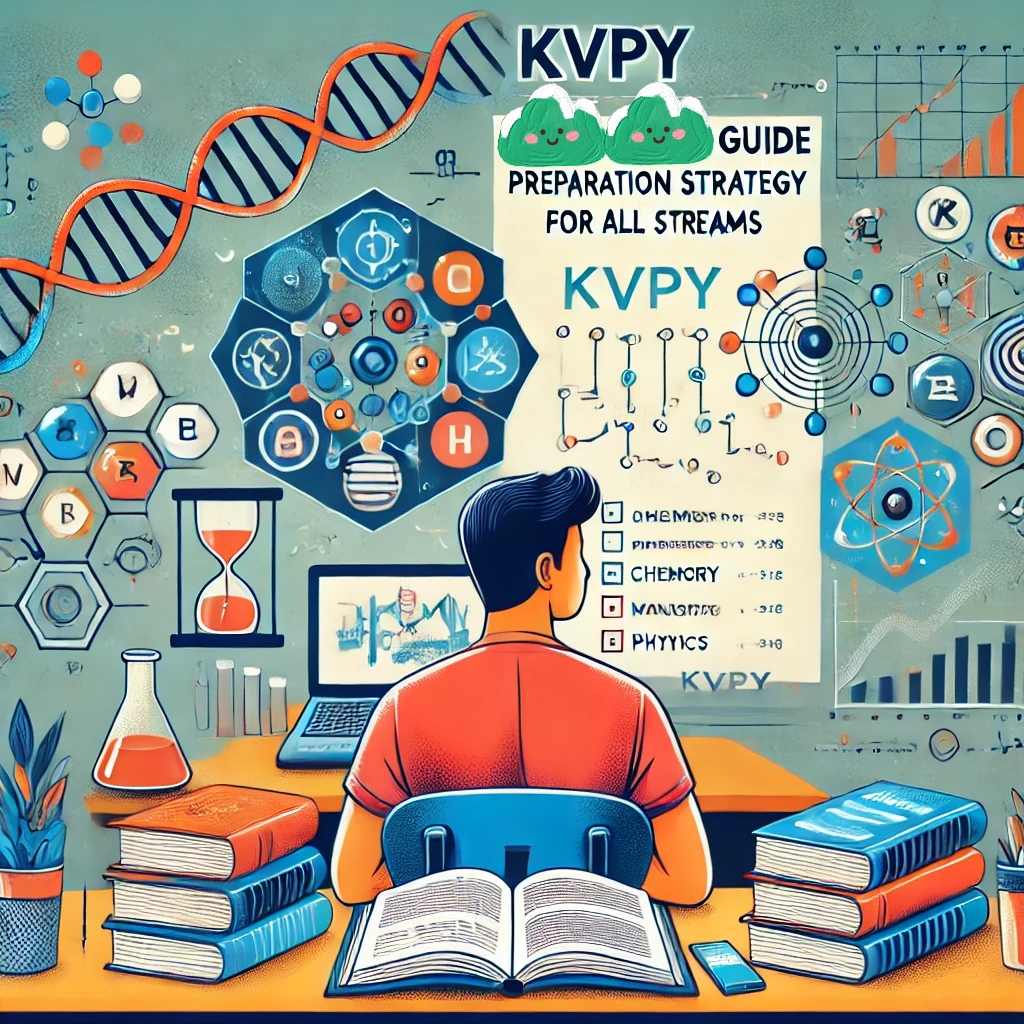KVPY Syllabus and Guide: Complete Preparation Strategy for All Streams

KVPY Syllabus and Guide: Complete Preparation Strategy for All Streams
The Kishore Vaigyanik Protsahan Yojana (KVPY) is a prestigious national-level scholarship program by the Department of Science and Technology, Government of India. It’s designed to encourage students to pursue research in basic sciences. Here, we’ll cover the entire syllabus, preparation strategies, and resources to help you excel in the KVPY exam for all streams: SA, SX, and SB.
—
KVPY Exam Overview
1. Streams:
SA: For students in Class 11 (Science).
SX: For students in Class 12 (Science).
SB: For 1st-year undergraduate students in B.Sc., B.S., or equivalent programs.
2. Exam Pattern:
Duration: 3 hours
Total Marks: 100 (SA) and 120 (SX/SB)
Subjects: Physics, Chemistry, Mathematics, Biology
Question Type: Multiple-choice questions (MCQs)
Marking Scheme:
Part I: +1 for correct, -0.25 for incorrect
Part II: +2 for correct, -0.5 for incorrect
KVPY Syllabus
KVPY does not have a rigid syllabus but generally follows the NCERT syllabus for Classes 10, 11, and 12. Here’s a breakdown:
SA Stream Syllabus (Class 11)
Physics:
Mechanics, Thermodynamics, Oscillations, Waves, Electricity, and Magnetism
Chemistry:
Atomic Structure, Chemical Bonding, States of Matter, Thermodynamics, and Organic Chemistry basics
Mathematics:
Algebra, Geometry, Trigonometry, Calculus (basics), and Statistics
Biology:
Cell Biology, Genetics, Evolution, Ecology, and Human Physiology
SX Stream Syllabus (Class 12)
Physics:
Electromagnetism, Optics, Modern Physics, Thermodynamics, and Fluid Mechanics
Chemistry:
Organic Chemistry, Chemical Kinetics, Electrochemistry, Atomic Structure, Periodic Table, and Physical Chemistry concepts
Mathematics:
Differential Calculus, Integral Calculus, Probability, Trigonometry, and Matrices & Determinants
Biology:
Biotechnology, Genetics, Ecology, Human Physiology, and Plant Biology
SB Stream Syllabus (First Year UG)
SB students are expected to have a strong grasp of Class 12 concepts plus additional topics from their 1st-year syllabus. Review the SX syllabus along with the first-year college syllabus for basic sciences.
—
How to Prepare for KVPY: Tips & Strategies
1. Focus on NCERT Books:
NCERT books (Classes 10-12) are essential for building a solid foundation, especially in Physics, Chemistry, and Biology. They cover the fundamental concepts required for KVPY.
2. Understand Concepts:
KVPY questions are concept-based rather than formula-driven. Spend time understanding concepts thoroughly. Practice questions that require critical thinking.
3. Practice Previous Year Papers:
Solving past papers will familiarize you with the pattern and difficulty level. It helps to identify commonly tested topics and build time-management skills.
4. Mock Tests and Time Management:
Regular mock tests are crucial to test your knowledge and manage your time during the actual exam. Analyze your performance in each test to improve.
5. Strengthen Problem-Solving Skills:
KVPY questions require analytical thinking, so practice solving problems quickly and accurately. Time yourself during practice sessions.
6. Use Quality Reference Books:
Physics: HC Verma’s Concepts of Physics, I.E. Irodov for problem-solving
Chemistry: O.P. Tandon for Organic and Physical Chemistry, NCERT for basics
Mathematics: R.D. Sharma for Class 11 and 12, Cengage for JEE-level problems
Biology: Trueman’s Biology and NCERT textbooks
7. Focus on Weak Subjects:
Identify weak subjects early on. Dedicate extra time to strengthen them. It’s essential to be balanced across all subjects.
8. Revise Regularly:
Allocate time for revision, especially for Physics and Chemistry formulas and Biology concepts. Revision should be continuous and thorough.
—
Suggested Study Plan
1. 3-4 Months Before Exam:
Focus on completing the syllabus while simultaneously practicing questions from each topic.
Start with foundational topics and gradually move to advanced concepts.
2. 1-2 Months Before Exam:
Start taking full-length mock tests. Analyze each test to work on weak areas.
Prioritize revision over learning new topics.
3. Final Weeks:
Avoid new topics; focus on revising formulas, key concepts, and short notes.
Practice 1-2 papers weekly, simulating real exam conditions.
—
Additional Resources
KVPY Official Website: Regularly check for updates on exam dates, patterns, and eligibility criteria.
Online Study Platforms: Websites like Khan Academy, Unacademy, and BYJU’s offer free resources and mock tests.
Coaching Classes: Consider coaching if you prefer structured guidance.
Key Takeaways
KVPY requires a deep understanding of fundamental concepts rather than rote memorization.
Prioritize time management and problem-solving skills.
Focus on NCERT and quality reference books to cover the KVPY syllabus comprehensively.
Conclusion
KVPY is challenging but achievable with consistent preparation, a focused approach, and disciplined practice. Stick to your study plan, focus on concept clarity, and manage your time effectively during the exam. With determination, you can excel and secure a valuable scholarship to fuel your passion for science!
Good luck with your KVPY preparation!